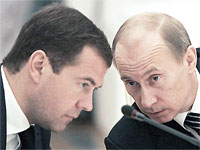Putin Says His And Medvedev's Ratings Behind Choice of Presidential Candidate
Interfax - 3.2.12 - JRL 2012-39
NOVO-OGARYOVO, Moscow region. March 2 (Interfax) - Russian Prime Minister Vladimir Putin has said the decision that he, not incumbent President Dmitry Medvedev, would run in the presidential election was made based on who had a better chance of winning the election.

After being asked at a meeting with the editors-in-chief of foreign media outlets why Putin thought that "he was better suited for the president's role than Medvedev", the premier said: "Have I ever said it? Have I ever said that I
am better suited for it?"
"Incumbent President Medvedev and I agreed that if the results of our joint work were positive, and if we had such an opportunity and saw it in social sentiments and public opinion surveys, then some of us would be able to run for Russia's president. And we have done so," Putin said.
Explaining this choice, the prime minister quoted Medvedev as saying: "Putin's rating is higher".
"We, as representatives of the same political force, should display solidarity in these conditions and refrain from showing any excessive personal interest in some specific seat or telephone number. We, as representatives of the same political force, ought to assess realistically who Russian citizens trust more and who has a better chance of winning and continuing the policy of the country's development," Putin said.
Putin disagreed with the description of a promise to appoint Medvedev the prime minister in the event of Putin's victory in the presidential elections as an example of some "political oligarchy".
In the United Kingdom, for example, if the party leader, who is also the prime minister, decides to quit his post in the party, his successor in the party automatically becomes the next prime minister, he said.
"The offer of the prime minister's post to Medvedev depended, among other factors, on a number of positive processes initiated by him in the economy, political reforms and the strengthening of democracy in the country. In fact, the initiatives announced by him during his presidency are what the government should put into practice," the premier said.
"Our power-sharing agreement is not just a desire to stay in power, but also a desire to continue the reforms that were launched earlier," he said.
At least five participants in the meeting asked Putin why he decided to run for president and what Medvedev did wrong during his presidency.
"Mr. Medvedev and I agreed which of us could run for president, but we would do so only if we saw that the results of our work allowed us - either me or him - to join the presidential race," Putin said.
But it was more than just a question of last year's popularity ratings of the two political figures, the premier said.
"The thing is that the rating of yours truly has been slightly higher over all these four years," he said.
Keywords: Russia, Government, Politics - Russia News - Russia
NOVO-OGARYOVO, Moscow region. March 2 (Interfax) - Russian Prime Minister Vladimir Putin has said the decision that he, not incumbent President Dmitry Medvedev, would run in the presidential election was made based on who had a better chance of winning the election.

After being asked at a meeting with the editors-in-chief of foreign media outlets why Putin thought that "he was better suited for the president's role than Medvedev", the premier said: "Have I ever said it? Have I ever said that I
am better suited for it?"
"Incumbent President Medvedev and I agreed that if the results of our joint work were positive, and if we had such an opportunity and saw it in social sentiments and public opinion surveys, then some of us would be able to run for Russia's president. And we have done so," Putin said.
Explaining this choice, the prime minister quoted Medvedev as saying: "Putin's rating is higher".
"We, as representatives of the same political force, should display solidarity in these conditions and refrain from showing any excessive personal interest in some specific seat or telephone number. We, as representatives of the same political force, ought to assess realistically who Russian citizens trust more and who has a better chance of winning and continuing the policy of the country's development," Putin said.
Putin disagreed with the description of a promise to appoint Medvedev the prime minister in the event of Putin's victory in the presidential elections as an example of some "political oligarchy".
In the United Kingdom, for example, if the party leader, who is also the prime minister, decides to quit his post in the party, his successor in the party automatically becomes the next prime minister, he said.
"The offer of the prime minister's post to Medvedev depended, among other factors, on a number of positive processes initiated by him in the economy, political reforms and the strengthening of democracy in the country. In fact, the initiatives announced by him during his presidency are what the government should put into practice," the premier said.
"Our power-sharing agreement is not just a desire to stay in power, but also a desire to continue the reforms that were launched earlier," he said.
At least five participants in the meeting asked Putin why he decided to run for president and what Medvedev did wrong during his presidency.
"Mr. Medvedev and I agreed which of us could run for president, but we would do so only if we saw that the results of our work allowed us - either me or him - to join the presidential race," Putin said.
But it was more than just a question of last year's popularity ratings of the two political figures, the premier said.
"The thing is that the rating of yours truly has been slightly higher over all these four years," he said.